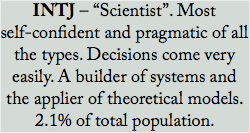This weekend was good. Ran away from home and relaxed myself, maybe a bit too much. In this idling time, I happened to come across these tests. Now this wasn’t a particularly insightful thing, or so I thought, in that the tests pretty much go, “Are you a geek?” Yes/No, some 300 times, and then tell you what you already knew.

Or so I thought. This whole blog was planned to mock the very nature of this test. Until I read this teeny line in the bottom of my results.
For more info on your Myers Briggs type click here.
A google search. The FIRST hit was this place. Now I am proclaiming the true glory of the people who’ve planned and interpret the results of this test. Why? Because they’re insanely, awesomely, accurate.
Cut and paste some most all of the text.
To outsiders, INTJs may appear to project an aura of “definiteness”, of self-confidence. This self-confidence, sometimes mistaken for simple arrogance by the less decisive, is actually of a very specific rather than a general nature; its source lies in the specialized knowledge systems that most INTJs start building at an early age. When it comes to their own areas of expertise — and INTJs can have several — they will be able to tell you almost immediately whether or not they can help you, and if so, how. INTJs know what they know, and perhaps still more importantly, they know what they don’t know.
INTJs are perfectionists, with a seemingly endless capacity for improving upon anything that takes their interest. What prevents them from becoming chronically bogged down in this pursuit of perfection is the pragmatism so characteristic of the type: INTJs apply (often ruthlessly) the criterion “Does it work?” to everything from their own research efforts to the prevailing social norms. This in turn produces an unusual independence of mind, freeing the INTJ from the constraints of authority, convention, or sentiment for its own sake.
INTJs are known as the “Systems Builders” of the types, perhaps in part because they possess the unusual trait combination of imagination and reliability. Whatever system an INTJ happens to be working on is for them the equivalent of a moral cause to an INFJ; both perfectionism and disregard for authority may come into play, as INTJs can be unsparing of both themselves and the others on the project. Anyone considered to be “slacking,” including superiors, will lose their respect — and will generally be made aware of this; INTJs have also been known to take it upon themselves to implement critical decisions without consulting their supervisors or co-workers. On the other hand, they do tend to be scrupulous and even-handed about recognizing the individual contributions that have gone into a project, and have a gift for seizing opportunities which others might not even notice.
In the broadest terms, what INTJs “do” tends to be what they “know”. Typical INTJ career choices are in the sciences and engineering, but they can be found wherever a combination of intellect and incisiveness are required (e.g., law, some areas of academia). INTJs can rise to management positions when they are willing to invest time in marketing their abilities as well as enhancing them, and (whether for the sake of ambition or the desire for privacy) many also find it useful to learn to simulate some degree of surface conformism in order to mask their inherent unconventionality.
Personal relationships, particularly romantic ones, can be the INTJ’s Achilles heel. While they are capable of caring deeply for others (usually a select few), and are willing to spend a great deal of time and effort on a relationship, the knowledge and self-confidence that make them so successful in other areas can suddenly abandon or mislead them in interpersonal situations.
This happens in part because many INTJs do not readily grasp the social rituals; for instance, they tend to have little patience and less understanding of such things as small talk and flirtation (which most types consider half the fun of a relationship). To complicate matters, INTJs are usually extremely private people, and can often be naturally impassive as well, which makes them easy to misread and misunderstand. Perhaps the most fundamental problem, however, is that INTJs really want people to make sense. :) ) This sometimes results in a peculiar naivete’, paralleling that of many Fs — only instead of expecting inexhaustible affection and empathy from a romantic relationship, the INTJ will expect inexhaustible reasonability and directness.
Probably the strongest INTJ assets in the interpersonal area are their intuitive abilities and their willingness to “work at” a relationship. Although as Ts they do not always have the kind of natural empathy that many Fs do, the Intuitive function can often act as a good substitute by synthesizing the probable meanings behind such things as tone of voice, turn of phrase, and facial expression. This ability can then be honed and directed by consistent, repeated efforts to understand and support those they care about, and those relationships which ultimately do become established with an INTJ tend to be characterized by their robustness, stability, and good communications.
Thus INTJs sweat the details or, at times, omit them. “I’ve made up my mind, don’t confuse me with the facts” could well have been said by an INTJ on a mission.
OH MY GOD! Sniff. Sniff. No, it’s a cold. I am not in tears. I’ve got a COLD and my eyes water.